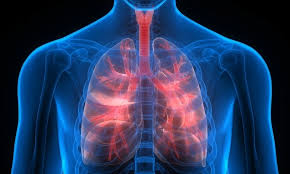Wildfires have become increasingly common across the East Coast, bringing along a dangerous and often underestimated threat—wildfire smoke. The thick plumes of smoke generated by these fires contain a mix of harmful pollutants, including particulate matter (PM2.5), carbon monoxide, volatile organic compounds (VOCs), and hydrocarbons. These toxic substances pose severe risks to respiratory health, especially for vulnerable individuals such as children, the elderly, pregnant women, and those with pre-existing lung conditions.

Understanding Wildfire Smoke and Its Composition
Wildfire smoke is a complex blend of gases and microscopic particles that can travel vast distances, affecting air quality even in areas far from the source. The most dangerous component is fine particulate matter (PM2.5)—tiny particles that can penetrate deep into the lungs and enter the bloodstream, triggering both immediate and long-term health complications.
How Wildfire Smoke Affects Lung Health
Immediate Health Effects of Wildfire Smoke Exposure
Even short-term exposure to wildfire smoke can cause various respiratory symptoms, including:
- Irritation of eyes, nose, and throat – Symptoms such as burning eyes, runny nose, sore throat, and coughing are common.
- Exacerbation of asthma and COPD – People with asthma, chronic obstructive pulmonary disease (COPD), and other respiratory disorders may experience severe flare-ups, increased shortness of breath, and a greater reliance on medication.
- Increased risk of respiratory infections – Inhaling toxic particles weakens the immune system, making individuals more susceptible to conditions like pneumonia and bronchitis.
Long-Term Consequences of Prolonged Exposure
Continuous exposure to wildfire smoke can lead to chronic health issues, including:
- Decreased lung function – Long-term exposure may result in a permanent decline in lung function, particularly in children whose lungs are still developing.
- Chronic respiratory diseases – Frequent exposure increases the risk of developing chronic bronchitis, asthma, and other lung disorders.
- Cardiovascular complications – PM2.5 particles can enter the bloodstream, causing systemic inflammation that raises the likelihood of heart disease, stroke, and high blood pressure.
Who Is Most at Risk?
According to Dr. Syed Nazeer Mahmood, a Pulmonary/Critical Care Medicine specialist at Bayhealth, certain groups are more vulnerable to the effects of wildfire smoke:
- Children – Their lungs are still developing, and they inhale more air per pound of body weight than adults.
- Older adults – Aging lungs and pre-existing health conditions increase their susceptibility.
- Pregnant women – Exposure can impact fetal development and increase the risk of complications.
- Individuals with respiratory conditions – Those with asthma, COPD, and other lung diseases are more prone to severe reactions.
How to Protect Yourself from Wildfire Smoke
Taking preventive measures can significantly reduce exposure and health risks associated with wildfire smoke. Here’s what you should do:
1. Monitor Air Quality Regularly
Check local Air Quality Index (AQI) reports from government agencies and weather apps. Avoid outdoor activities when air quality is poor, particularly if AQI levels exceed 100.
2. Stay Indoors During High-Smoke Events
- Keep windows and doors closed.
- Use air conditioning with a clean, high-efficiency filter.
- Avoid activities that generate indoor pollution, such as burning candles, using gas stoves, and smoking.
3. Use High-Quality Air Purifiers
Invest in HEPA (High-Efficiency Particulate Air) filters to remove fine particles from indoor air. Portable air purifiers can be particularly helpful in reducing smoke exposure inside homes.
4. Wear Protective Masks Outdoors
Ordinary face masks and cloth coverings do not provide adequate protection against wildfire smoke. Instead, use N95 or P100 respirator masks, which are designed to filter out fine particulate matter.
5. Stay Hydrated and Support Your Respiratory System
- Drink plenty of water to keep airways moist and facilitate mucus clearance.
- Use saline nasal sprays to soothe irritated nasal passages.
- Consider steam inhalation or a humidifier to help clear airways.
Additional Safety Tips for Those in High-Risk Areas
- Create a clean-air space in your home by designating a room with an air purifier and minimal exposure to outside air.
- Evacuate if necessary – If wildfire smoke persists and reaches hazardous levels, consider relocating to a safer area with better air quality.
- Stay informed – Follow updates from local health officials and emergency services regarding smoke conditions and recommended precautions.
Frequently Asked Questions:
Q1: How does wildfire smoke affect the lungs?
A: Wildfire smoke contains fine particles (PM2.5) that penetrate deep into the lungs, causing irritation, inflammation, and increasing the risk of respiratory diseases and infections.
Q2: What are the symptoms of wildfire smoke exposure?
A: Common symptoms include burning eyes, runny nose, coughing, sore throat, shortness of breath, and exacerbation of asthma or COPD symptoms.
Q3: How can I protect myself from wildfire smoke?
A: Monitor air quality, stay indoors with windows closed, use HEPA air purifiers, wear N95 masks outdoors, and stay hydrated to keep airways clear.
Q4: Can wildfire smoke cause long-term health effects?
A: Yes, prolonged exposure can lead to chronic respiratory conditions, reduced lung function, and an increased risk of heart disease and stroke.
Q5: Who is most vulnerable to wildfire smoke?
A: Children, older adults, pregnant women, and individuals with pre-existing lung diseases are at higher risk of severe health effects.




